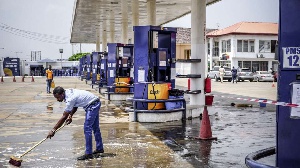Nigeria has this past week indicated its gradual departure from over-dependence on oil sales in a new plan that banks on five major sectors of the economy.
According to the new five-year economic plan released by the Central Bank of Nigeria (CBN), the country aims to reduce the debt burden, control inflation and raise the employment rate for youth. It reiterates earlier sector-based plans that included a ban on the importation of 43 items to reduce the depletion of foreign reserves of $36.57 billion, which can only sustain importation of essential goods for nine months.
The plan has also retained the exchange rate of N420 to the dollar to reduce the impact of the erratic exchange rate on the economy and stabilise the external debt.
As Africa’s biggest old producer, Nigerian officials say the commodity limits the economy, because of reliance on the changing global oil prices. In the plan, Nigeria intends to diversify the economy with less dependence on revenue from oil and gas and increase production of non-oil based products, especially in agriculture.
Minister of State for Petroleum Resources Timipre Sylva said on Monday that the nation’s earnings, from oil and non-oil sectors, coupled with low revenue receipts from the Federal Inland Revenue Service (FIRS), have dropped by 60 per cent, putting the nation’s economy under serious pressure.
Nigeria also had a national debt burden of $86 billion and an inflation rate of 14.23 percent.
“There is less activity in the oil industry which is driving the economy. So you find out it is a double whammy from all sides,” Mr Sylva briefed President Muhammadu Buhari.
The country also says it will take part in a free trade regime driven by the African Union but will reserve clauses that could lead to an undue influx of imports and stunt its own industrial growth.
Godwin Emefiele, the CBN Governor said in the five-year plan Nigeria will seek “to preserve domestic macroeconomic and financial stability.”
By 2025, Nigeria hopes to have established a proper payments system infrastructure that will increase access to credit to all Nigerians, thereby raising the financial inclusion rate in the country.
According to Mr Emefiele, the government will continue to work with deposit-taking financial institutions to improve access to credit for smallholder farmers and Medium and Small Scale Enterprises (MSMEs), as well as consumer credit and mortgage facilities for bank customers.
The World Bank puts Nigeria’s GDP at $397 billion, the highest in Africa and one of the world’s biggest oil exporters, pumping out at least two million barrels daily.
High inflation
On Monday, the National Bureau of Statistics (NBS) presented an inflation rate of 14.23 per cent for the month of October, indicating a 14-month continuous increase in prices.
CBN says it intends to grow the nation’s external reserves and support efforts at diversifying the economy.
The bank has launched an automated trade monitoring system, which will reduce the time required to process export documents from one week to a day.
“We will also work with our counterparts in the fiscal arm in supporting improved foreign direct investment flows to various sectors such as agriculture, manufacturing, insurance and infrastructure,’’ Mr Emefiele said. “In the next five years, we intend to pursue a programme of recapitalising the banking industry so as to position Nigerian banks among the top 500 in the world.’’
In the past three years, Nigeria has taken loans from the World Bank and Paris Club of creditors to bridge its budget deficits, causing a spike in debt.
According to the NBS, 34.89 per cent of the total federal and state public debt is external, and domestic debt accounts for 65.11 per cent.
As the financial situation becomes more precarious due to the negative impact of the coronavirus pandemic, the government has stopped providing a subsidy on petroleum products, which has been eating into the annual budget.
The Financial Operations report in March of the Nigerian National Petroleum Corporation shows that $1.06 billion was paid to subsidise Premium Motor Spirit in March 2019 and about $2.1 billion in the first quarter of 2020.
President Buhari effected the deregulation of the downstream sector, which effectively removed the subsidies.
According to the Petroleum Products Pricing Regulatory Agency the petrol price will be adjusted in accordance with global oil prices.
Ayuba Wabba, the president of the Nigerian Labour Congress, was concerned about the move. “We are surprised that at a time when other countries are giving palliatives to their citizens to cushion the effect of Covid-19, Nigerians are asked to pay more for petrol,” he said.
Information and Culture Minister Lai Mohammed said the debt is non--threatening, and that unlike in the past when the nation borrowed to “service the crass indulgence of a few fat cats”, the loans being obtained by the current administration are being primarily used to finance infrastructure - roads, railways, bridges and power.
In September, at the Presidential Economic Advisory Council, President Buhari justified the borrowing.
“We have so many challenges with infrastructure. We just have to take loans to do roads, rail and power so that investors will find us attractive and come here to put their money,’’ he said.
Africa Business News of Monday, 23 November 2020
Source: theeastafrican.co.uk

















